On the 28th of November, for the first time in Nepal, Digital Economy Conclave took place and was successfully completed. This was a one-day event comprising of 8 talk series which brought together the policymakers, top ICT experts, industry leaders and doers, bankers, entrepreneurs, media, and the major stakeholders to hold a discourse on needs, opportunities, challenges, and the way forward in the journey of transforming the Nepalese economy digitally. It officially started at 9:00 AM on Saturday and was simultaneously webcasted from YouTube, Twitter, and Facebook at the same time, and broadcasted from AP1 TV. The major organizers were BrandWorth Pvt. Ltd. and AP1 TV.
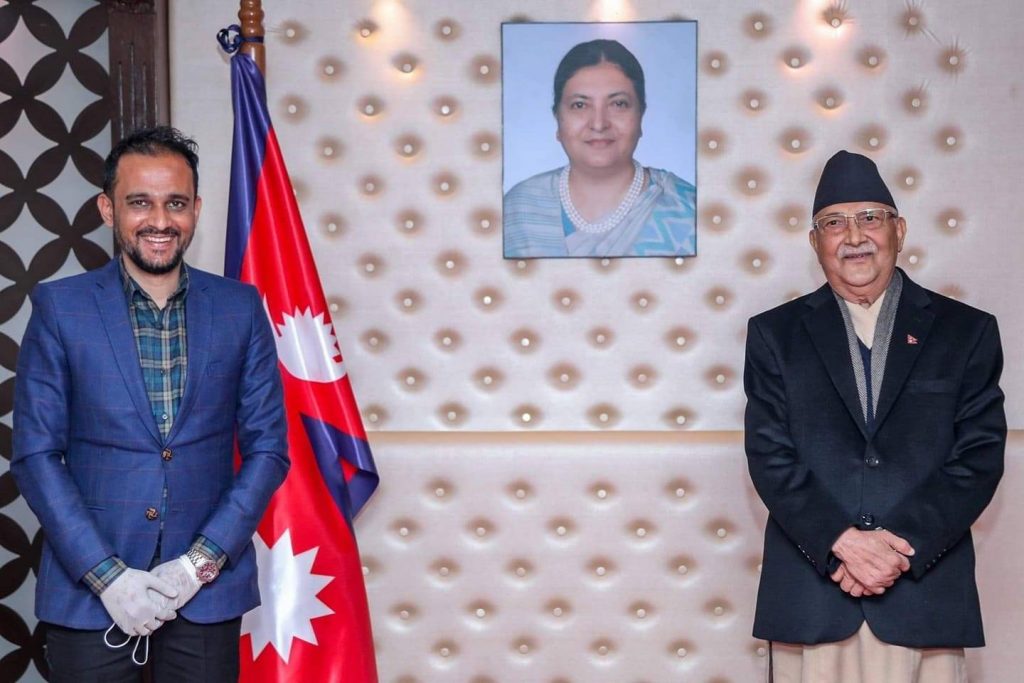
The event kicked off with the welcome speech on the opening session by Captain Ramsharan Thapa, the chairperson of Annapurna Media, where he welcomed everyone and thanked them for the presence of guests, moderators, and panelists. Fonepay Digital Economy conclave took its pace with the keynote address by the Prime Minister of Nepal, K.P. Sharma Oli. He ensured that the government in his leadership is not only working to control the spread and managing the consequences of the Covid-19 pandemic but also has aligned with the concept of the digital economy. Similarly, he addressed the most important thing to be considered, i.e. the first draft of the Digital Nepal Framework has already been prepared and passed by the Council of Ministers, which would be a milestone for the regulatory base for the digital economy that is dreamt of. Applauding the role of private sectors in digital transformation, he even gave his commitment towards fastening the work of bringing the services of Nepal Government under an integrated system, rendering the services through National ID, spreading the installation of optical fiber in every province along with the flow of digital awareness, access of internet services all over the country and good governance.
Fonepay Digital Economic Conclave 2020: Sessions
Key Session: In Conversation with Ministers: “One Goal of Digital Nepal”
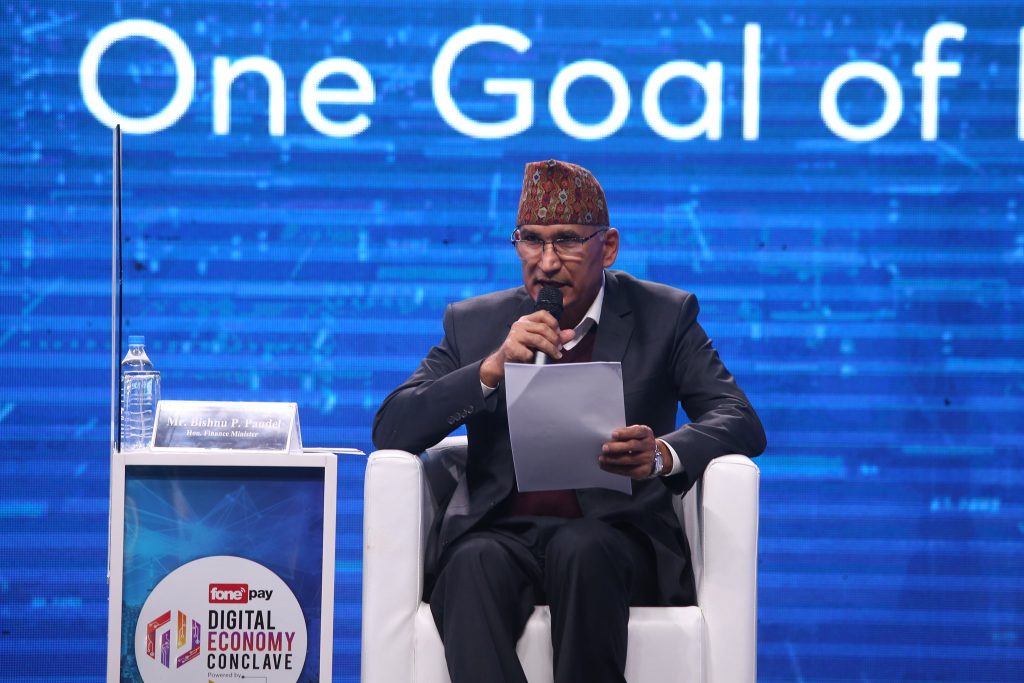
The key session: In conversation with ministers: “One Goal of Digital Nepal” was moderated by Mr. Tikaram Yatri, Editor-in-Chief of AP1 TV. The panelists for this session were Hon. Minister of Finance Bishnu Prasad Paudel and Hon. Minister of Communication and Information Technology Mr. Parbat Gurung. Pertaining to the context of Digital Nepal Framework-2076, this session went on; for which the Finance Minister informed that more than 70% of the government payments have been executed digitally. He added that under this framework, there are 8 priority sectors identified and 80 sub-sectors are selected. Also, he said that the government has been doing its homework in the ways to implement this framework, and through this event, he appealed to all the ICT experts and stakeholders to come to the table for interaction with policymakers for proper implementation of this.
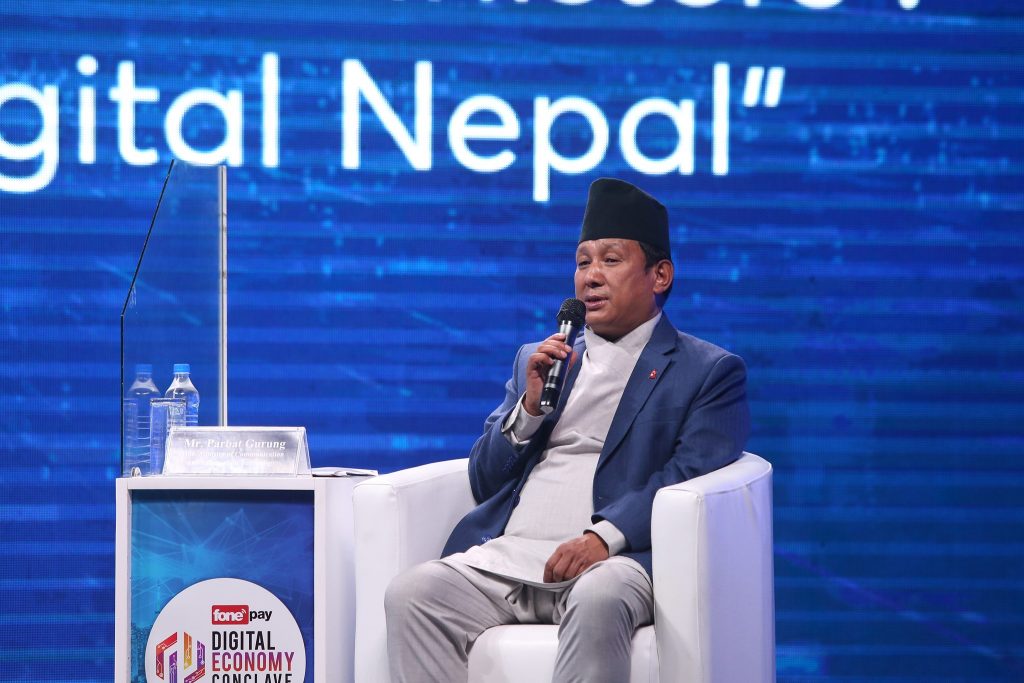
The minister of Communication and Information Technology Mr. Parbat Gurung said that the infrastructures like optical fiber services, telephone towers, 4G technology are on the way to spreading all over the country. He further added, directives from the policy level have been formulated and prospective study for the satellite has been started. Similarly, the Information Highway (Suchana Mahamarga), inaugurated by PM KP Sharma Oli in Galchhi is also another brick in the wall. He opined that along with the infrastructures, digital literacy, and skillful manpower in the ICT sectors are required to implement this framework successfully. Also, he pointed out the possible unemployment that could take place in the process of digitization in the economy.
In the same thing, Finance Minister Bishnu Prasad Paudel added that there are some major concerns that are challenging the digital economy. They are:
- Sustainable operation of IT
- Privacy and secrecy of transactions
- Security of data and system
- Legalization of financial transactions
- Bringing the new businesses under tax liability
- Spread of digital literacy, technology and infrastructures
Session 1: When will Nepal Become Digital?
Moderated by Mr. Biswas Dhakal, president of F1 Soft Group, the panelists for this session were Mr. Mahaprasad Adhikari, NRB Governor; Mr. Madhu Marasini, Financial Comptroller General of GON; and Mr. Purushottam Khanal, Chairman, Nepal Telecommunication Authority. The session started with the backdrop of the current scenario of banking, governmental finances, and network infrastructures, for which all three of the panelists ensured they are taking the lead from their respective position to attain the common goal of the digital economy. On the question if Nepal’s every transaction would be digital (without physical presence) in his tenure, the governor replied that we cannot wipe out the physical presence of the banking sector totally, however, NRB is considering issues like disbursement of the loan, licensing the PSPs and PSOs, opening e-KYC and international payment for discussion.
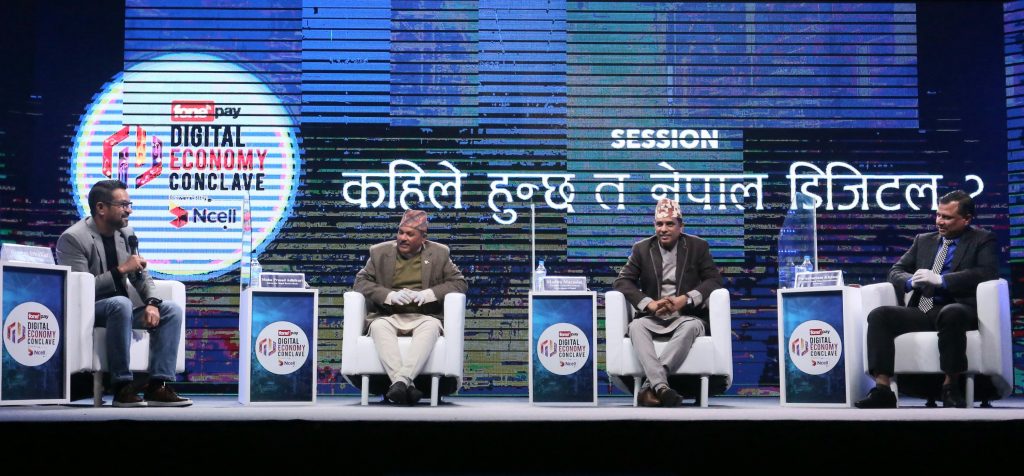
On the public query of when will Nepal get full access to international payment, he replied that this is one of the most important agendas of NRB. On top of that, he also announced at this event, on the behalf of NRB that they are soon making provision to allow Nepalese to open their dollar account up to $500 in the balance, to start a business in the global arena, or to make payments for e-commerce.
Similarly, the financial controller general revealed that his office displays the up to date record of the budgetary status of the government. They have also introduced technologies like the Public Assets Management System (PAMS) to keep track of all assets of the Nepal Government and its departments and the RTGS system for funds transfer in higher amounts.
Similarly, Mr. Dhakal addressed that spreading digital awareness is equally important as spreading access to infrastructure. However, except for the geographical constraints in some areas, NTA has never discriminated against developing the infrastructures.
This session ended with a conclusion that the goal of the digital economy would be only attained with the collective partnership of government bodies, businesses, private sectors, and the public.
Session 2: Payment: The Race is on!
This session had the panelists Mrs. Reena Chand, Head of Card Center, NIBL; Mr. Soumya Basu, Senior Director- Business Development, South Asia, Visa, and Mr. Ritesh Shukla, CEO, NPCI International Payments Limited. It was moderated by Mr. Dipta Shah, Founder, 54iVentures. They discussed with a brief flashback on the past scenario of card usage when everything was manual. Both international guests showed their readiness to share the knowledge and technology with both central banks of Nepal and India for the common good because the problems both countries faced are similar, be it in financial inclusion offering direct benefits to consumers, having a truly interoperable system, disbursing cash and transferring payments in a cost-effective manner. All the panelists agreed that regulatory support from the policymakers and regulators, matching of vision between the partners, and infrastructural support are the strong pillars of developing the payment mechanism.
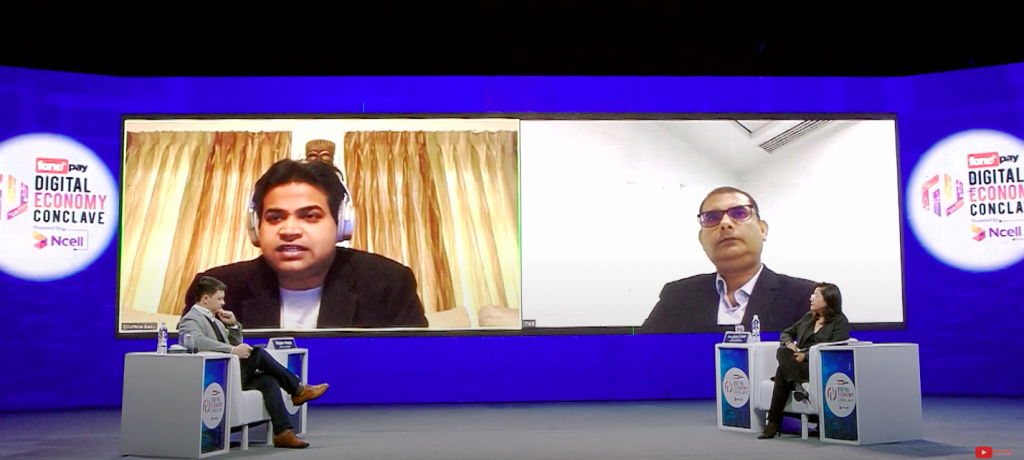
Similarly, the security concern cannot be ignored. Both Mr. Basu and Mr. Shukla assured the data security and privacy of consumers from their side on behalf of Visa and NPCI respectively, with their robust technology. In response to the question for all the panelists regarding how the payment ecosystem would look like in near future, and how to accomplish it, they all had the same voice: “The future is bright!” They opined that envisioning that goal to the grass root level would be challenging right now, but there are still many possibilities.
Session 3: Digital Remittance: The cost of moving money
Moderated by Mr. Daniel D Shrestha, Director of eSewa money transfer, the panelists were Mr. Nirvana Chaudhary, MD, Chaudhary Group; Mr. Bal Krishna Joshi, Co-Founder, Machnet Technologies Inc.; Mr. Suman Pokhrel, CEO, IME Limited and Mr. Matt Oppenheimer, CEO, Remitly. This session focused on how the remittance that has an average of 30% contribution on the country’s GDP, faced the Covid-pandemic and the way forward.
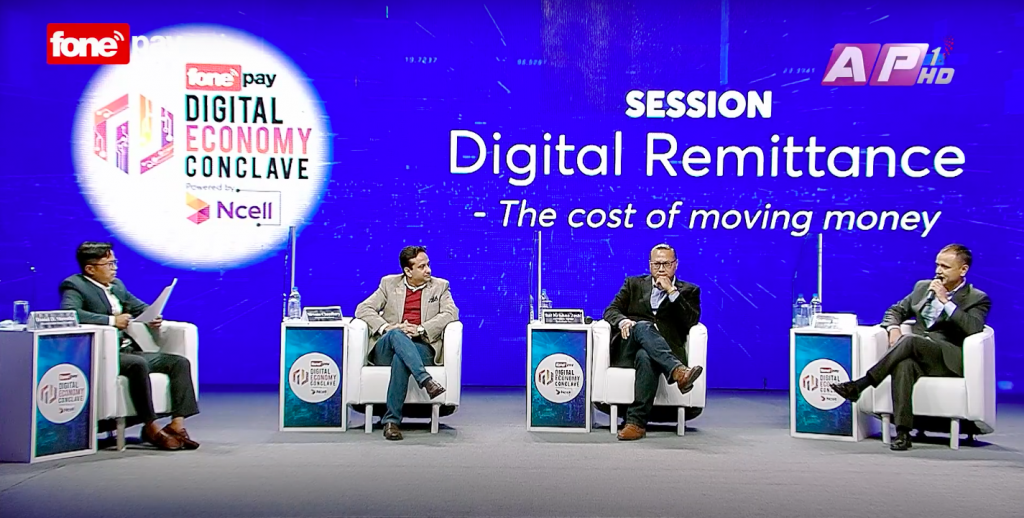
All the panelists touched upon the topic of their journey in this remittance industry from its inception to the present where the cost of remittance is projected by the World Bank to be reduced to 3% by 2030. Mr. Suman Pokharel placed the data that Nepal is one of the cheapest in the cost of remittance which is 4.62% as per World Bank, which makes us in a better position in this path. And despite the World Bank’s projection of about a 20% decline of global remittance in 2020, all the panelists agreed upon the fact that the pandemic has proven to be a great catalyst to the growth of digital remittance. In Nepal too, a record high of more than Rs 100 billion remittances was received in the month of August. The main drivers for this increase are the sealing of borders and airports for a time being which has compelled people to transfer the earnings through remittance rather than in the form of physical goods or from the informal sector.
Where there are many prospects of the development of digital remittance, the conclusion was that there is a long way to go for seeing the actual change on a larger scale. The major challenges are: getting whole infrastructural support from telecom and banking sectors, regulatory support in the policy level, and the level of education and awareness at the grass-root level about digital remittance is very low, for which it needs a long window period unlike in the developed countries. The level of trust, the prices which people pay from both receiving and paying side, and the security of the customer’s data is a very important factor in this ecosystem.
Session: 4 Digital Banking : Bank 4.0
With the growing products and services in the banking spectrum, there is still a lot more to do to attain the goal of digital banking in Nepal. To talk on this topic, this session had Mr. Chintamani Siwakoti, Deputy Governor, NRB; Mr. Kiran K Shrestha, CEO, Rastriya Banijya Bank; Mrs. Aarti Rana, Deputy General Manager, Sunrise Bank Limited and Mr. Bhuvan K. Dahal, CEO, Sanima Bank as the panelists. This session was moderated by Mr. Sanjib Subba, CEO, NEPS.
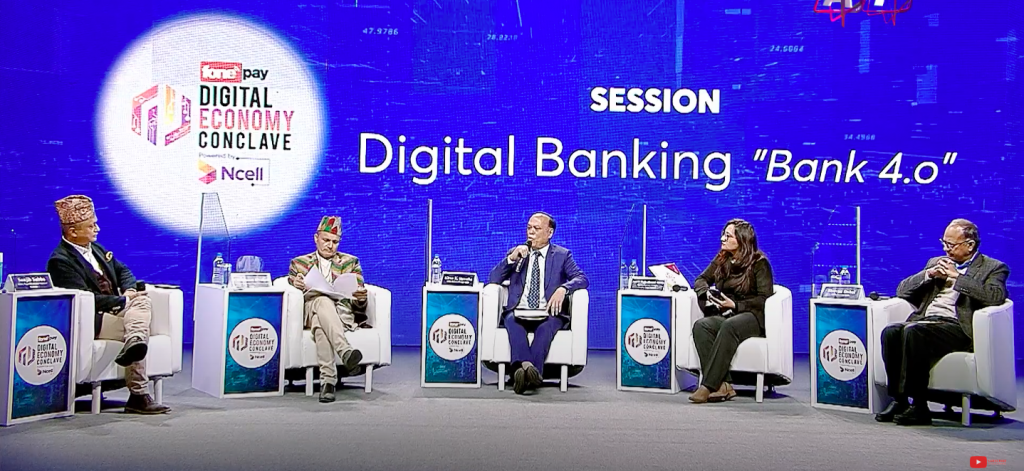
As the panelist Mr. Bhuvan stated, the prospects of transforming brick banking to click banking and more towards touch banking in the near future is inevitable. For this, there needs to be internal automation in the banking sector and reliable payment solutions, which can include even the local merchants for whom registering as e-commerce is not feasible somehow. On the same context, all the panelists agreed that the level of penetration of mobile usage and digital banking is still low, for which Mr. Kiran informed that Rashtriya Banijya Bank in collaboration with Nepal Telecom is going to establish Nepal Digital Company with Rs 1 billion capital, which aims to leverage the wide customer base of both entities in expanding the payment services in rural areas of Nepal. In this regard, Mr. Chintamani shed some light on the efforts made from the policy level in facilitating digital banking in the past years like the introduction of RTGS rule, licensing the PSPs and PSOs, maintaining transaction limit of digital banking, verification process, and data security of the users and many others, which have helped to create a conducive environment for the growth of digital banking. The panel discussion ended with a conclusion that although considerable change has been seen in the banking sector lately, there are still some constraints like lower access to the internet and mobile services in the rural area, market coverage of digital banking, and lack of awareness among the people regarding the reliability and security of their transactions.
Session 5: In-line or On-line
This session was moderated by Mr. Deependra Chaulagain, Director of Operations, Samriddhi Foundation. The panelists were Mr. Purna Prasad Acharya, CEO, CDS & Clearing Limited; Mrs. Sewa Pathak, CEO, Vianet Communications; Mr. Subhas Sapkota, CEO, eSewa and Mr.Neelesh Man Singh, CEO, NCHL.
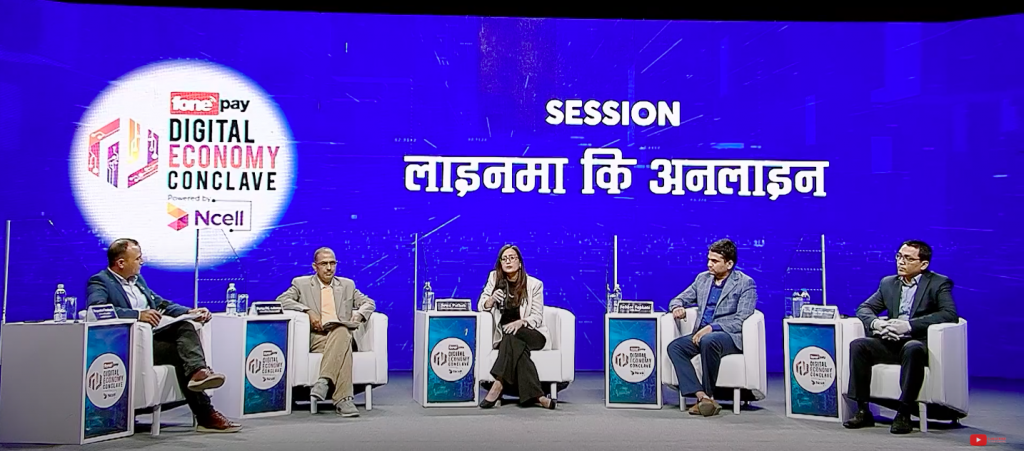
The session started with the journey of businesses and consumers going in line online. For this, Mrs. Sewa said that going online has been rather a necessity, which has been accelerated by Covid. The increasing number of applications of IPO because of the online system, all-time high daily transactions, and the ease during the settlement of transactions; the exponential use of data consumption because of work from home and online learning, an increase of digital payments in covid-pandemic, ease in the clearing of cheques and other banking transactions were the major achievements discussed in this session. With these changes and further possibilities, the panelists focused on the major challenges in online service delivery like the problem in wider acceptance of the payment products by customers which has made them carry cash even when having digital wallets and still prevalent traditional verification process despite online registration service. The mindset of people also needs to be changed where there’s still skepticism towards the reliability of data security because of how the online media has been portraying the news. The need of cutting edge technology for regular upgrade of system and investment in this technology is another challenge for this. The session concluded with a notion that collective effort from all the concerned bodies and entities can gear up the process of going online by staying in line.
Session 6: Facilitating Digital Marketplace
This session had a discourse on e-commerce, its prospects, and challenges on the way of the digital economy; for which the panelists were Mr. Ganesh Pd. Pandeya, Joint Secretary, Ministry of Industry, Commerce & Supplies; Ms. Nikita Acharya, Co-Founder, Urban Girl; Mr. Amun Thapa, Founder & CEO, Sasto Deal and Mr. Manohar Adhikari, Founder, Foodmandu. It was moderated by Mr. Saurav Dhakal, Founder, StoryCycle. The major concern was how to expand the e-commerce services outside of Kathmandu valley. The entrepreneurs on the panelist team said they are expanding the services and are seeing many prospects for this. They also agreed that e-commerce has boomed amidst this covid pandemic. Similarly, Mr. Ganesh Pd. Pandeya said that the government has entertained the development of e-commerce in Nepal and the policymakers are in the process of drafting and formulating policies and legal frameworks for the operation of e-commerce and payment activities that come within. He ensured that the main objective is to promote e-commerce, including SMEs and MSMEs in the e-commerce ecosystem, bringing them under the legal framework and safeguarding consumer rights as well. Mr. Pandeya focused on the main hurdles in e-commerce is related to logistics which are physical infrastructures like road access, communication and internet services, and the lack of city mapping in the urban settlement.
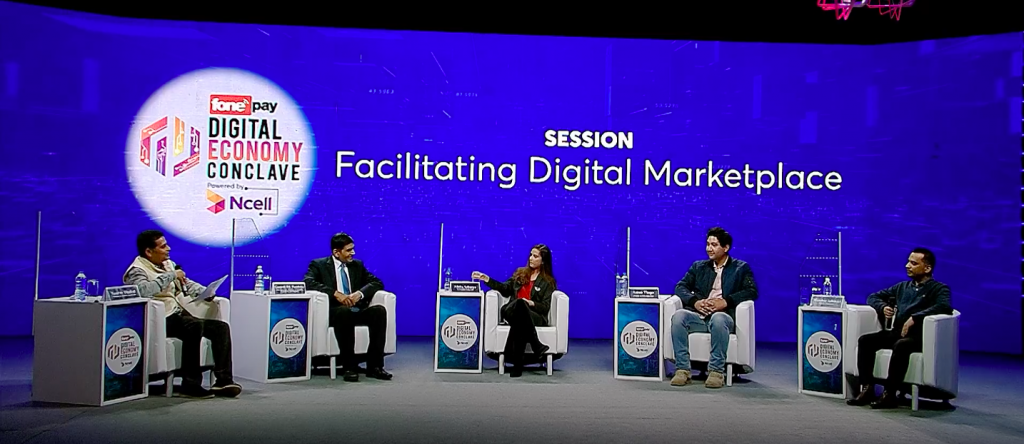
In the context of challenges to e-commerce, the e-commerce entrepreneurs pointed out that digital divide among the people has hindered the capacity enhancement of human resources, access to finance and investment opportunities, logistics management, and international payment gateways.
Session 7: eLearning: Going Back to School
The new normal established by Covid-19 is eLearning, which has drastically transformed the traditional learning pedagogy. The panelists for this session on e-learning were Ms. Swastika Shrestha, CEO, Teach For Nepal; Mr. Deepak Sharma, Spokesperson, Ministry of Education, Science and Technology and Mr. Medin Lamichhane, Principal, Ullens School. It was moderated by Mr. Narottam Aryal, President, King’s College.
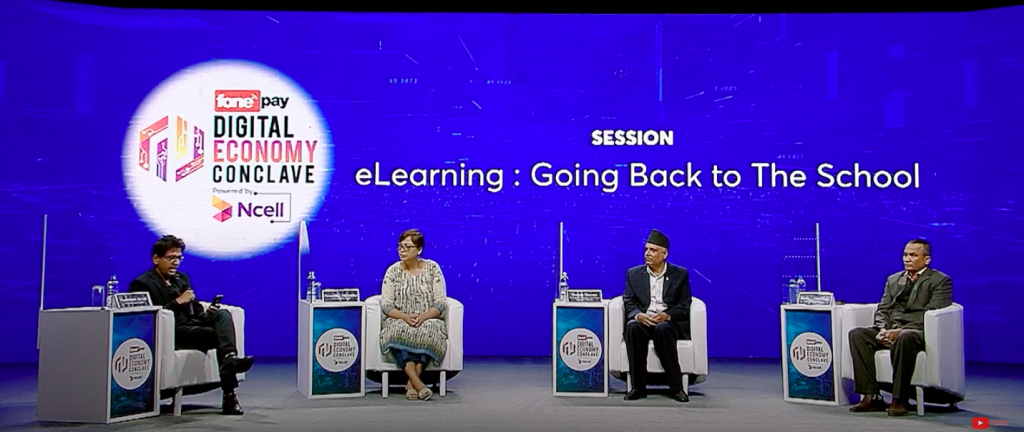
The discourse started with its own ritual of accessing the condition of e-learning amid the covid- pandemic and the way forward post-covid. All the panelists had the same voice over this topic that no one in the education sector was fully prepared for this unforeseen circumstance. And the digital divide between the people of urban and rural areas along with the disparity in access of all the facilities among the public school students and private school students has led institutions like Teach for Nepal to try out each and every possible option to continue the education. Similarly, the insufficient coordination between educational institutions, local government, and the central government left everyone indecisive for any action.
The session concluded with the acceptance that Covid-19 has transformed the teaching pedagogy, assessment procedures, technology usage in learning, assignment and engaging the students in interaction for a time being, which needs to be continued post-covid as well to harness the development of technology in educational sectors as well through a hand-in-hand contribution of all related sectors under this scope.
Conclusion: Fonepay Digital Economic Conclave 2020
In a nutshell, this conclave has inaugurated the discussions that are required time and again to make people aware of the direction we are going in the path of the digital economy. Similarly, it is an eye-opener for all the policymakers who are required to play their integral role in attaining the goal of making about 50% of digital conversion in Nepal by 2025. As Mr. Biswas Dhakal said in his closing remarks, Fonepay Digital Economy Conclave has created value by initiating the discussion of people from various spectrums who are directly or indirectly related to this ecosystem and without the collective effort of whom, the digital economy would be just a dream. From reducing the cost of remittance to establishing network infrastructures, ensuring data and system security in banking and payment services, spreading awareness and organizing digital literacy programs like this, and then to get regulatory support from the policy level, this conclave has given the floor for many discussions which are essential for institutionalizing the practice of digital acceptance and lessening the digital divide among all.


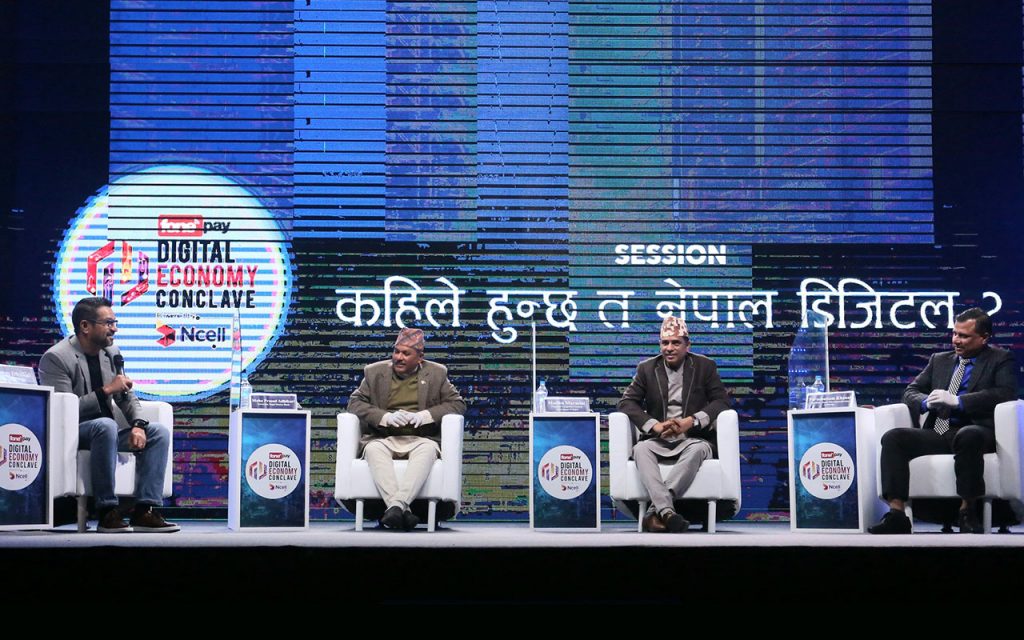




1 Comment
Pingback: Get Ready to Experience the Most Awaited USSD Based Digital Wallet in Nepal - NamastePay - TechSathi